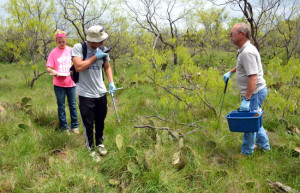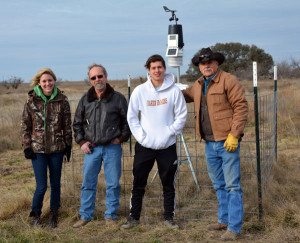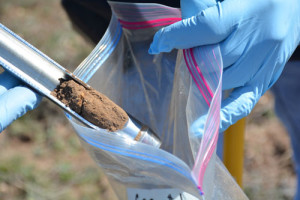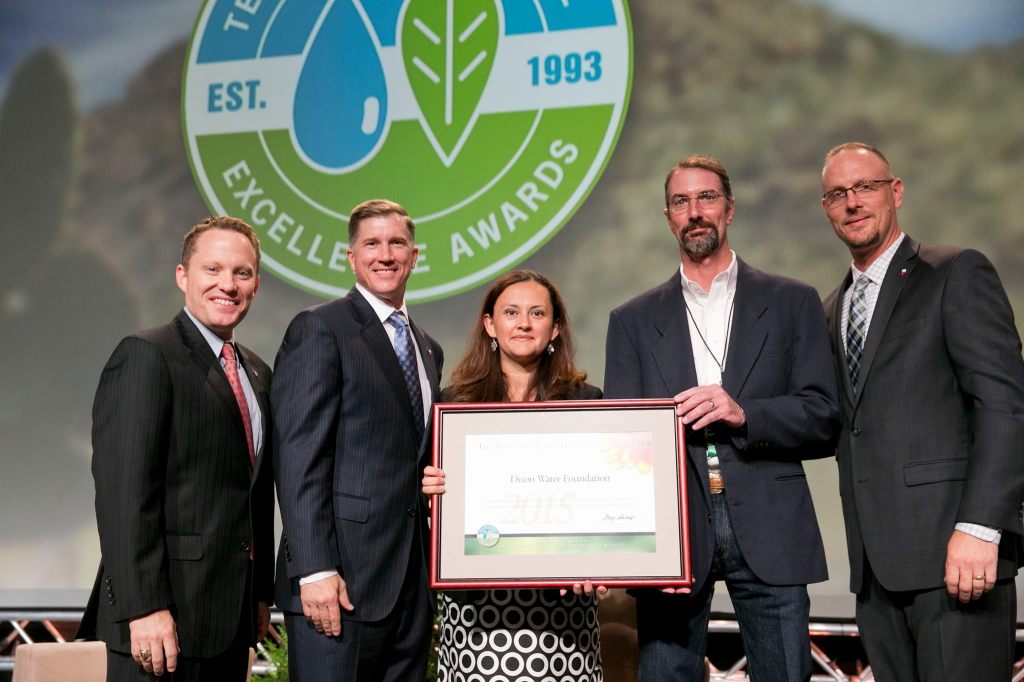ABILENE—Under every farm and ranch around Abilene, a universe of microorganisms is toiling in the soil. Hardin-Simmons University researchers recently received a Dixon Water Foundation grant to explore how land management affects this subterranean world on a Runnels County ranch.

Hardin-Simmons University students Karissa Olson, Isaiah Longoria, and Michael Flud collecting soil samples from the wildlife pasture at Newman Ranch. Photo by Marla Potess
“Our food, our water resources, and many other ecosystem services start with soil,” said Marla Potess, an HSU environmental science professor leading the research. “Over the last 100 years, we’ve been really hard on our soils. Even with good, scientifically based management, soils are degrading, and many ecosystems are moving from highly productive to less productive. So I’m very interested in managing soils to improve microbial biodiversity, which may impact water retention and plant biodiversity and productivity.”
In what they hope will become a long-term study, Potess and HSU biology professor Jennifer Hennigan are examining soil microorganisms on the Newman Ranch in Runnels County, about 40 miles south of Abilene. HSU professor emeritus and trustee George Newman invited the university to use his ranches as outdoor laboratories and created an endowment to fund research on his family property.

HSU environmental science students with professor emeritus Dr. George Newman by the weather station at Newman Ranch. Photo by Marla Potess
“For the past 40 years, as time and finances have allowed, I have been converting my cropland back into native grassland,” Newman said. “I feel that my philosophy of land stewardship closely mirrors that of the Dixon Water Foundation and I am very appreciative of their support for this program.”
The Newman Ranch study sites have the same soil type but have been managed very differently, Potess explained. For example, one site is a cultivated hay grazer field, while another is being restored to native prairie grasses. Potess and Hennigan are looking for differences in the soil microbial communities at each site, which they eventually hope to correlate with different management techniques used in each pasture.
HSU students have been actively involved in the research, collecting and analyzing soil samples and drafting research proposals related to the project. The Dixon Water Foundation grant will fund DNA sequencing that will provide a snapshot of the microbial diversity at each study site.

The Dixon Water Foundation grant will be used to analyze DNA from soil core samples collected earlier this year. Photo by Marla Potess
“It’s exciting for students to participate in a project that’s asking really important questions and filling in real information gaps,” says Potess. “The preliminary data this spring indicates we’re on the right track, so we’re really excited to see what we find this summer when the DNA is extracted and processed.”
Ultimately this research could help farmers and ranchers better understand how their actions aboveground affect the microscopic world underground.
“The hypothesis is if soils have diverse, healthy microorganisms, they can hold more water,” Potess said. “And that has important implications for drought resistance for crops and restoring grasslands.”
Those implications helped attract support from the Dixon Water Foundation, which promotes healthy watersheds through sustainable land management. The foundation funds research and education projects tied to this mission and demonstrates sustainable grazing management on its four ranches in North and West Texas.
“We hope this research will help farmers and ranchers improve the economic productivity of their land by building healthier soils and healthier watersheds,” said Robert Potts, the foundation’s president and CEO.
 The Dixon Water Foundation was honored with a
The Dixon Water Foundation was honored with a 

